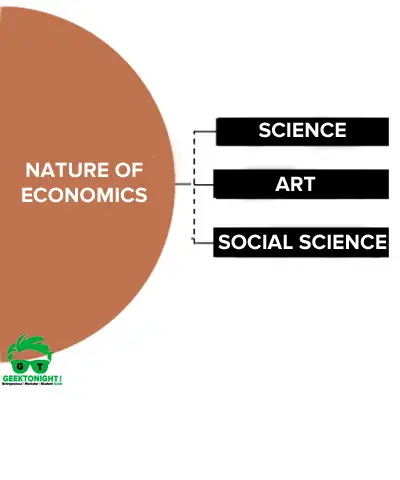Nature of Economics
Similar to the economics definition, there are a number of controversial issues related to its nature of economics. Some economists consider economics as a science, or economics as a social science while others have a believe economics as an art.

Economics as a Science
A subject is considered science if:
- It is a study of the relationship between cause and effect.
- It is capable of measurable and based on facts.
- It has its own methodological apparatus.
- It should have the ability to forecast.
After being analyzed, economics has all the features of science.
- Like science, it has a cause and effect relationship between economic phenomena.
For instance, Law of demand explains the cause and effect relationship between price and quantity demanded a commodity. - Similarly, the outcomes are measurable in terms of money.
- It has its own methodology of study (induction and deduction).
- It forecasts the future market condition with the help of various statistical and non-statistical tools.
Thus, a majority of economic laws are of this type and therefore, economics as a science.
Critics
Economics as a science but not a perfect science like physical science. The fact is that we cannot rely upon the accuracy of the economic laws. The predictions made on the basis of economic laws can easily go wrong.
In other words, the subject matter of economics is the economic behaviour of man which is highly unpredictable.
The next question arises as to whether Economics is positive or normative in nature.
Two nature of economics as a science
Economics as a science can be of two nature of economics
Positive Economics
A Positive Economics or science that is based on cause and effect relationship between variables but it does not pass value judgment. In other words, it states “what is”.
Positive statements are about facts. They state what the reality is. Economics should be neutral between ends. It is not for economists to pass value judgments and make pronouncements on the goodness or otherwise of human decisions.
Normative Economics
As normative economics or science, economics involves value judgments. It is prescriptive in nature and describes ‘what ought to be’ or ‘what should be the things’.
Normative economics is concerned with normative statements. In this case, economics is not concerned with facts rather it is concerned with how things should be.
For example, the questions like what should be the level of national income, what should be the wage rate, how much of national product be distributed among people – all fall within the scope of normative economics. Thus, normative economics is concerned with welfare propositions.
The above discussion shows that Economics is both positive as well as normative in nature.
Also Read: What is Economics?
Economics as an Art
Art is a branch of study that deals with expressing or applying the creative skills and imagination of humans to perform a certain activity.
Similarly, economics also requires human imagination for the practical application of scientific laws, principles, and theories to perform a particular activity.
Art is a system of rules for the achievement of a given end. We know that in practice, economics is used for achieving a variety of goals.
Every individual economic unit has an economic goal to achieve. It decides its course of action by keeping in mind the end to be achieved and the situation faced by it. Therefore, economic laws are widely used and relied upon at all levels of our economic activities. And that makes economics an art.
- Art tells us how to do the thing i.e. to achieve an objective. Economics is also used for achieving a variety of goals.
- For e.g. All policies etc made in economics has the ultimate objective of solving economic problems.
- For e.g. All policies etc made in economics has the ultimate objective of solving economic problems.
- Art is the practical application of theoretical knowledge Like Art, Economics also practices its theoretical laws.
- For e.g. The various policies are made only after having theoretical knowledge of the society and country as a whole. Hence, economics is also an art.
Also Read: Difference Between Micro and Macro Economics
Economics as a social science
Economics is also considered as social science as it deals with studying the behaviour of human beings and their relationships in society. This is because of the exchange of goods takes place within the society and among different societies to satisfy the needs and wants of people.
Economics is a social science:
- Economists develop models, or theories, which are simplified representations of the real world.
- Models help economists to understand, explain, and predict real-world economic phenomena.
- Like other social scientists, economists usually do not perform laboratory experiments. They typically examine what has already occurred in order to test their theories.
- Economic theories, like all scientific theories, are simplifications—and hence are “unrealistic.”
- Economists, as do all scientists, employ assumptions. One important economic assumption is “all other things being equal.”
- Models are evaluated on their ability to predict and not on the realism of assumptions.
- Economic models relate to behavior, not thought processes.
Also Read: What is Business Cycle?
Conclusion
From the above discussion about the nature of managerial economics, we can say that, economics as a science, economics as an art as well as economics as a social science. economics has science in its methodology and art in its application.
Leave a Reply